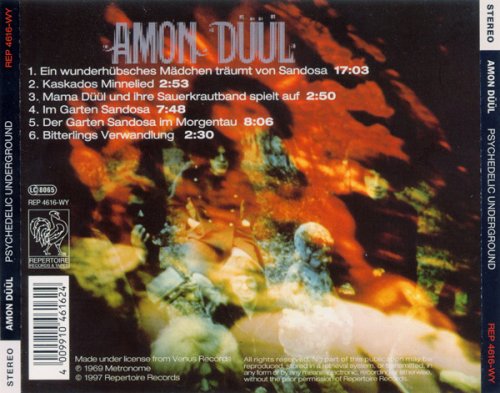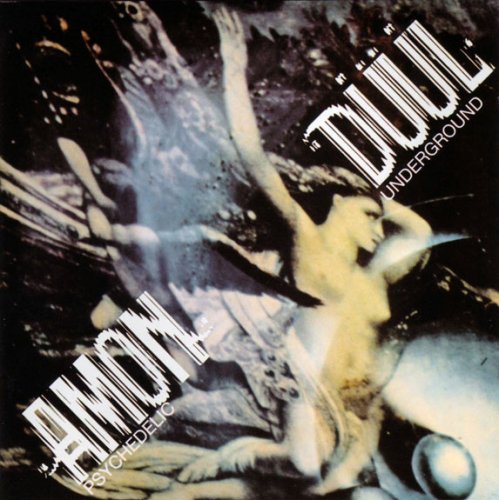
Amon Düül - Psychedelic Underground (Reissue) (1969/1997)
BAND/ARTIST: Amon Düül
- Title: Psychedelic Underground
- Year Of Release: 1969/1997
- Label: Repertoire Records
- Genre: Krautrock, Psychedelic Rock, Experimental
- Quality: Mp3 320 / APE (image, .cue, log) / Flac (tracks, 24/96)
- Total Time: 41:18
- Total Size: 101/255/923 Mb (scans)
- WebSite: Album Preview

Tracklist:
1. Im Garten Sandosa 17:05
2. Der Garten Sandosa Im Morgentau 2:56
3. Bitterlings Verwandlung 2:56
4. Ein Wunderhübsches Mädchen Träumt Von Sandosa 7:50
5. Kaskados Minnelied 8:08
6. Mama Düül Und Ihre Sauerkrautband Spielt Auf 2:30
Line-up::
Angelica Filanda- Vocals, Percussion
Helge Filanda- Congas, Anvil
Ella Bauer- Vocals, Percussion
Rainer Bauer- Guitar, Vocals
Ullrich Leopold- Bass
Peter Leopold - Drums
Uschi Obermaier- Percussion
Wolfgang Krischke - Piano, Percussion
This is probably the most rock’n roll album of all time, should you consider the mentality and atmosphere. Some psychheads will rave on for hours of the Garage bands sprouting in Southern California in the second part of the 60’s, or the Detroit proto-punk scene of 68, but obviously those purists tend to disregard anything done in Germany by early pioneers like Amon Düül and Can. So out of Munich came these “eleven adults and two children which are gathered to make all kinds of expressions, also musical” (sic), and the hippy commune eventually broke up into two units, the first is this group that will record only two real sessions, the first being a huge jam that would eventually produced three albums and four discs worth of material, the other being Paradieswarts Düül. The second part, Amon Duul II, will become much more successful, but please see that entry. BTW, Amon Düül’s name comes from an Egyptian mythological god (Amon) and a Turkish fictional character Düül.
The least one can say is that AD’s sole historic record (the others were posthumous, if memory serves) is that it is a very cringey time for progheads looking for the usual prog clichés. Here, we are light years away from good production, good recording, tight arrangements and virtuosi interplay: what one would have to realize is that both version of AD came from heavy left-wing hippy communes and therefore the group’s sound sounds as chaotic as you’d imagine a commune to be back then. Actually the Repertoire CD issue shows a few band pictures with the women in the band proudly showing the kids, and most likely a certain kind of promiscuity. Starting on a 17-mins Sondosa track, where they give the tone of the album, just repeating endlessly a riff, without any kind of musical explorations, except for the hypnotic nature of their “minimalist” approach to their musical universe, the group finishes the album with a three-minutes fast-evolving improv centred around the cello player. There is a bit of space rock ala Hawkwind avant-la-lettre feel throughout this album.
On the flipside, Mama Düül is a very percussive 3-mins track that strikes you as complete waste of tape, unless you’re into shaman-type of percussion dances. Garten Sandosa is another slowly evolving jam built on repetitive riff, where some bass drones (most likely the cello again) are the main interest. The following Garten Morgantau (also an 8-miun improv) is again featuring cello under very approximate guitar arpeggios, with soft spacey Gilly Smyth-like whispers. Ending the album is Bitterlings Verwandlung another absurd jam stuck with classical (choirs) music sound collage that had never been done until then.
The least one can say is that AD’s sole historic record (the others were posthumous, if memory serves) is that it is a very cringey time for progheads looking for the usual prog clichés. Here, we are light years away from good production, good recording, tight arrangements and virtuosi interplay: what one would have to realize is that both version of AD came from heavy left-wing hippy communes and therefore the group’s sound sounds as chaotic as you’d imagine a commune to be back then. Actually the Repertoire CD issue shows a few band pictures with the women in the band proudly showing the kids, and most likely a certain kind of promiscuity. Starting on a 17-mins Sondosa track, where they give the tone of the album, just repeating endlessly a riff, without any kind of musical explorations, except for the hypnotic nature of their “minimalist” approach to their musical universe, the group finishes the album with a three-minutes fast-evolving improv centred around the cello player. There is a bit of space rock ala Hawkwind avant-la-lettre feel throughout this album.
On the flipside, Mama Düül is a very percussive 3-mins track that strikes you as complete waste of tape, unless you’re into shaman-type of percussion dances. Garten Sandosa is another slowly evolving jam built on repetitive riff, where some bass drones (most likely the cello again) are the main interest. The following Garten Morgantau (also an 8-miun improv) is again featuring cello under very approximate guitar arpeggios, with soft spacey Gilly Smyth-like whispers. Ending the album is Bitterlings Verwandlung another absurd jam stuck with classical (choirs) music sound collage that had never been done until then.
Oldies | Rock | FLAC / APE | Mp3 | HD & Vinyl
As a ISRA.CLOUD's PREMIUM member you will have the following benefits:
- Unlimited high speed downloads
- Download directly without waiting time
- Unlimited parallel downloads
- Support for download accelerators
- No advertising
- Resume broken downloads


